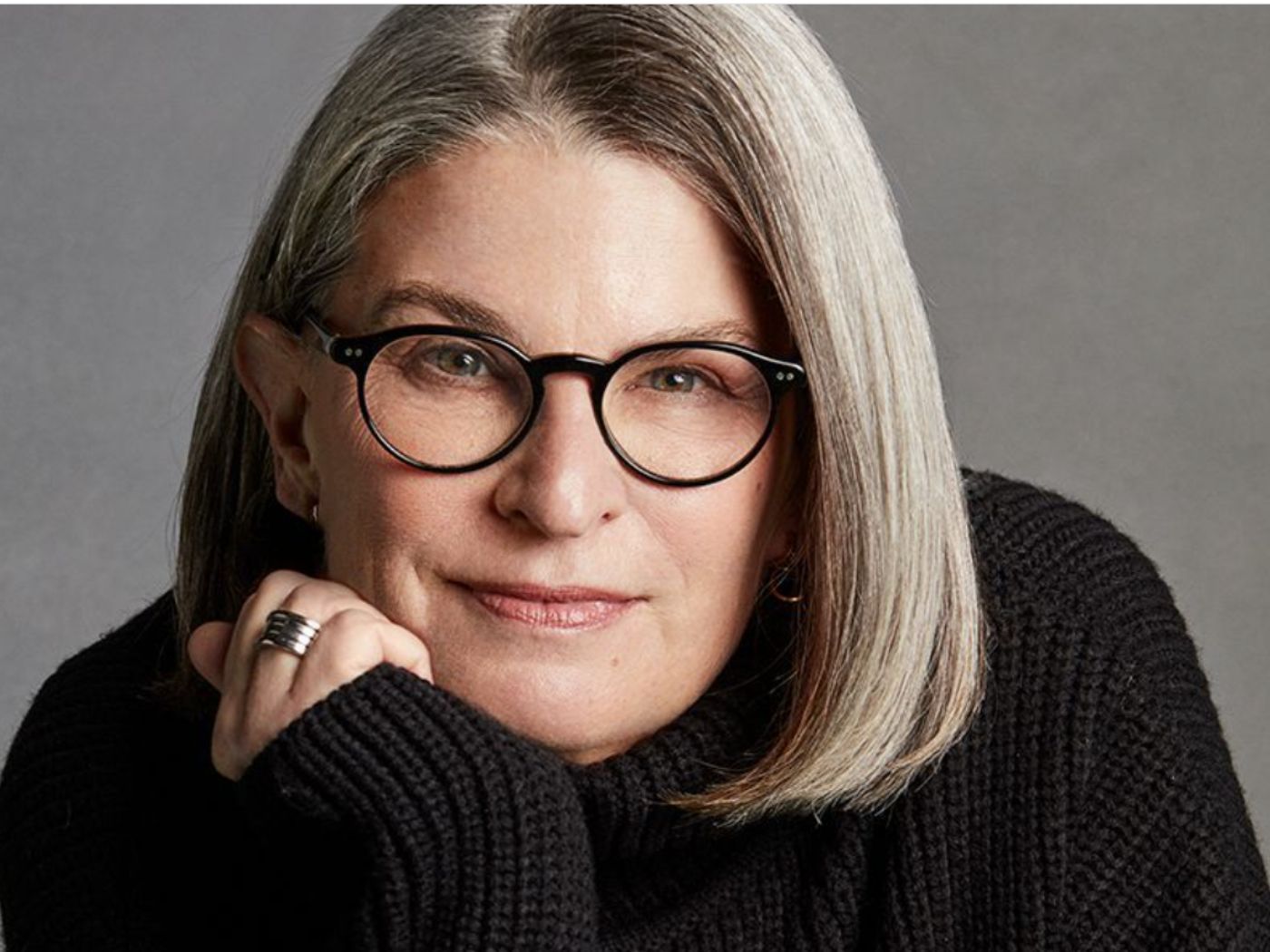“I hope I meet you someday,” Sally Susman says at the end of our conversation. As Executive Vice President and Chief Corporate Affairs Officer at Pfizer, this is the woman who kept America informed on Pfizer’s vaccine progress during the pandemic. You know, just that little thing.
And yet… she hopes to meet me? Her words struck — and stuck. Not only because she made time on a Saturday, right before a flight, to sneak in this last-minute interview, but because in that moment, I experienced exactly why Sally and the leadership lessons in a new book, Breaking Through, really do break through: They’re genuine.
Indeed, her rep for humbleness and authenticity are perhaps one of the key reasons Sally has been so successful at, as the book’s subtitle suggests, opening minds, moving hearts, and changing the world.

“Reputation is a measuring stick of your character, and it can be enhanced in the smallest ways and detracted from in the smallest ways — it’s not just big epic events,” says Sally, who previously served as Executive Vice President of Global Communications for Estée Lauder. “Do you send a thank-you note? Do you greet colleagues by name? Do you offer your time to someone who needs it? If you do those sorts of things, you become known as a gracious or generous person.”
The concept has been part of her ethos since she was a teenager, far before she made history during a global pandemic. Tucked in an envelope in her suitcase by her dad when she went to college was a piece of paper on which was written: “Your reputation is your most important asset,” and, as she says, “I’ve held onto that.”
Of course, having a great reputation also involves getting sh*t done (hello, COVID vaccine rollout!). Things like: Do you meet your stated goals? Do you have quality control? Do you have safe and effective products? “I learned a lot about this at the Estée Lauder companies working for Leonard and Wiliam, because it’s their name on the door,” she says. “In life, your name is on the door, even if it’s just to yourself.”
In Breaking Through, Susman explores 10 ‘aha’ principles “that sound easy but I know to be quite hard,” which she says apply to leadership across any industry. After all, she’s spent 40 years moving between finance, beauty, and biopharmaceuticals and collaborating with nine CEOs, cabinet secretaries, and senators. “All of these thoughts crystallized when I was on the front lines at Pfizer, working with our CEO and the team to bring forward a vaccine in record time.”
Here, Sally shares her top tips for galvanizing teams, moving up, changing jobs — and how to not just dissent, but loyally dissent. Whatever your front lines, there’s wisdom to apply.
Q: If you had to choose, which is the singular principle of the 10?
“The first one, which is to be intentional. Some leaders take communications as a soft skill, a nice-to-do, while others see it for the rock-hard competency that it is — that it’s as important as finance, or accounting, to the success of their enterprise. Those CEOs prepare and review their thoughts. Sometimes I see people waltz onto the stage and bash into a presentation without stopping, reflecting, pausing, and really centering themselves around what it is they want to say and how they hope the listener will feel after the exchange.”
Q: You talk about being courageous. What does that mean to you in the workplace?
“I learned my courage lesson in the mid-1980s when I came out as a gay woman. Back then, it was quite taboo, and many people chose to live in the closet. What I found as the result of being courageous is that you might have short-term pain, but I was rewarded in long-term peace and pride and the ability to make authentic relationships. The same is true in politics and business when people have the courage to speak from their hearts to say something unpopular: There definitely is a short-term awkward moment. But almost universally I see it rewarded with more respect and with attention paid to what you say.”
Q: What kind of short-term ramifications did you deal with?
“When I first started at Pfizer, I promoted a campaign in support of healthy aging and did a lot of large visual images of older people in happy settings. I chose two gentlemen sitting at a cafe table, and the tagline was ‘First Date.’ I overheard two people [walking past the images] and one said, ‘I don’t know who did that, but they’re going to get fired.’ And I thought to myself, ‘If I do, I do.’ Inevitably, people will whisper behind your back or think differently of you, but those aren’t the people you want to befriend or want to work with.”
Q: You have a chapter in the book about being angry, and another about manners, and you hit on the idea of candor. How do you stay gracious and kind while also being direct?
“I think it’s important to assume a decent and good intention in the other person. Do not assume they are against you. Try to set that aside; it’s not helpful. Second, try to strike a tone in your voice, in your appearance, in your body language that shows you’re open. There’s a story in the book I tell, where a consultant of mine told me that my face fell naturally into a frown and scowl. I looked angry but I didn’t feel that way. Thanks to that courageous consultant, I learned how to make a slight adjustment so my face feels as open as my spirit. If people see you coming down the hall loaded for bear, it’s not a good sign.
“I also find asking questions very helpful. Lead into your topic with a question or two that makes it a true dialogue and not a series of monologues. Make sure you’re listening, and not to just rebut what the person is saying, and then speak your truth.”
Q: How do you know when to stop with your truth when you work within a big company?
“If you work for a company, at the end of the day it’s a team sport. I’ve had many occasions in the privacy of my boss’s office or in a conference room with the team where I’ve expressed my loyal dissent. But at the end of the day, if the decision goes another way, I feel it’s very important to get on board and fight for the team. If you don’t feel you can do that, you should start your own business and I mean that not with cynicism and not in a snarky way.”
Q: Is “loyal dissent” one of your phrases? It brings to mind the origins of the civil rights movement.
“‘Loyal dissent’ is something that came forth spontaneously! But ‘good trouble’ is one of my favorite phrases. It’s an ideal I’ve admired in others.”
Q: What blocks women leaders from moving into the C-suite?
“To advance, you should solicit honest feedback. Sometimes people say in a joking way that feedback is a gift, but I actually believe that. I once got surprising and painful feedback during a 360 review in the 1990s when I worked at American Express. I heard that I tended to manage up. I was devastated because I don’t see myself that way, but everybody around me saw it. I knew I faced a choice: I could change, or I could get stuck. So I focused on it. I committed to it. I talked about it. And I held myself accountable.”
Q: How do you hold yourself accountable?
“Holding myself accountable means I can be purposeful about it and make sure I’m not doing the things that surround the comment. If I work on something with a partner, I’ll have the partner send it into the boss because I don’t want to be seen as stepping in front of someone that way.
“I also have a couple of friends and we refer to each other as ‘the posse.’ I encourage young folks in particular to build your posse. It can’t be anyone who works for you. It has to be an independent peer or friend or cousin who will say to you, ‘Gosh, you sound arrogant in this comment,’ and to this day I actively solicit feedback and I do have a coach. Not everybody can access that or afford it, but there’s a version everyone can find.”
Q: What does “culture fit” mean to you, and how do you think leaders should think about it when joining a new company or hiring a team?
“Culture fit is the most important thing to look for when considering a new job. I spoke recently at Gettysburg College in Pennsylvania, and one of the students asked me whether to take a first job in a company or on Capitol Hill. I said that isn’t the most important question when considering the job. It’s more to work at a place where you feel like you will thrive — not survive, thrive.”
Q: How do you determine that, though? What do you look for?
“You look for if the people who interviewed you listened to you. Did the office environment feel like the kind of place you would like to work? And the student said, ‘That’s why I chose the Gettysburg campus, this is for me.’ How you feel is more important than a particular product.”
Q: There’s a lot of chatter lately about how poorly corporate America treats its employees. What do you believe, as a leader, you can do to keep a team motivated?
“In my experience, the thing that is most galvanizing and inspiring to teams is to help people connect what they do to a larger purpose. There’s a wonderful story about when John Kennedy went to the Space Center to see the takeoff of Apollo. He greeted a janitor and asked, ‘What is it you do,’ expecting him to say something like, ‘I keep the space clean.’ But he said, ‘I’m putting a man on the moon.’ I saw that come to life during the pandemic when suddenly our purpose — ours is ‘breakthroughs that change patients’ lives’— was in a put-up-or-shut-up moment. You need to ladder people up directly to that mission.”
Q: There aren’t as many women at the top as there should be. How do you best uplift other women?
“One thing we do at my company is we publish data on promotions, pay equity, and overall levels both for women and minorities in the U.S. What you measure is what matters to you. The most important thing I try to do to address this gap is peer-to-peer mentoring. It’s hard for all people, but particularly women, to raise their own hands for something. For example, I’m in a peer-to-peer mentor [relationship] with Lisa Sherman, the CEO of the Ad Council. So if I hear of an opportunity to go on TV or be on a board or be invited to an important forum, I always suggest her name.”
Q: There are so many layoffs these days in media and tech. What do you say to leaders who have been in high-profile positions who now find themselves without a company behind them?
“I met Dan Roth when he was a senior reporter at Fortune magazine. He did a large profile on the Lauder family, and I’ve always admired him as a journalist. At one point, he left traditional media and went to be an editor at a company I’d never heard of called LinkedIn. He now has 300,000 followers. Brands and companies go up and down. Your reputation is what can anchor you. For individuals, their reputation can proceed or even supersede the brand they work for.”




